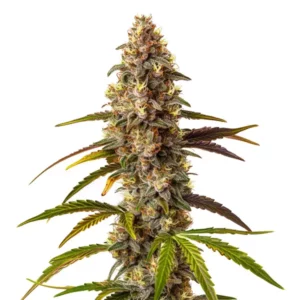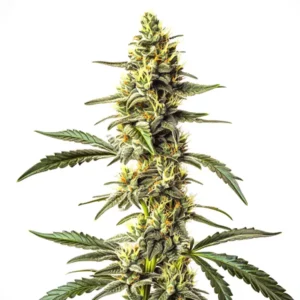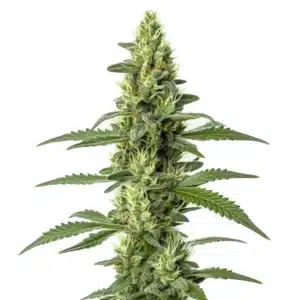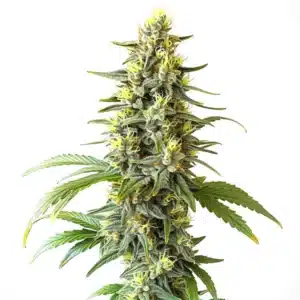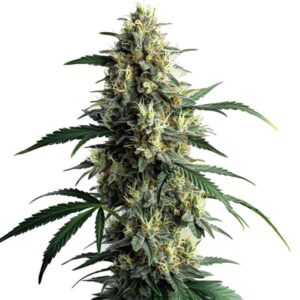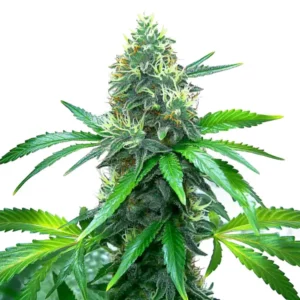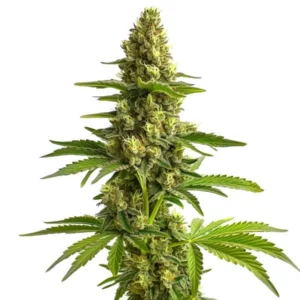
Enzymes Used in Hemp Cannabinoid Production
In the world of hemp cultivation, enzymes play a crucial part. These tiny proteins speed up chemical reactions, making them essential for hemp cannabinoid production. Enzymes used in hemp cannabinoid production help growers enhance efficiency and boost crop yield. This is particularly important for those looking to maximize the medicinal and commercial potential of hemp.
Enzyme-assisted cannabinoid extraction from hemp is gaining popularity. This method improves the quality and quantity of cannabinoids, the compounds responsible for hemp’s effects. Enzymes help break down the plant material, releasing cannabinoids more efficiently. As a result, producers get more product from less plant material.
Recommended Strains
Quarter Pounder Auto
|
|
THC | 20% - 27% (Medium) |
|
|
Type | Autoflowering |
|
|
Yield | Low |
|
|
Phenotype | 40% Indica / 60% Sativa |
Mimosa
|
|
THC | 24% - 30% (High) |
|
|
Type | Feminized |
|
|
Yield | High |
|
|
Phenotype | 30% Indica / 70% Sativa |
Biocatalysis in hemp cannabinoid synthesis involves using enzymes to catalyze, or speed up, chemical reactions. This process is eco-friendly and cost-effective. It reduces the need for harsh chemicals and high energy consumption. As a grower, knowing these processes can significantly impact your yield and product quality.
Enzymes for Enhanced CBD Yield in Hemp Processing
CBD, short for cannabidiol, is one of the main cannabinoids found in hemp. It’s sought after for its potential health benefits, ranging from pain relief to anxiety reduction. Enzymes can boost CBD yield by breaking down hemp fibers and facilitating the release of cannabinoids.
Optimizing hemp cannabinoid production with enzymes means incorporating enzyme technology into your growing and processing methods. This approach not only increases CBD yield but also improves the overall quality of the extract. For instance, the use of cellulase, an enzyme that breaks down cellulose, can significantly enhance extraction efficiency.
Enzymes used in hemp cannabinoid production are crucial in ensuring that growers can achieve maximum efficiency. By integrating these enzymes into the processing stages, growers can ensure that every part of the hemp plant is utilized to its full potential. This not only elevates the quantity of CBD extracted but also contributes to a more sustainable approach by minimizing waste.
Furthermore, the application of enzymes for enhanced CBD yield in hemp processing helps in maintaining the integrity of the cannabinoids. This ensures that the therapeutic properties of CBD are preserved, making the final product more effective and appealing to consumers. The precision and efficiency of enzymes make them an indispensable tool in modern hemp cultivation strategies.
Enzyme Technology in Hemp-Derived Cannabinoid Manufacturing
Enzyme technology in hemp-derived cannabinoid manufacturing is a game-changer. It allows for a more sustainable production process. By using enzymes, manufacturers can minimize waste and reduce environmental impact. This is especially important in today’s eco-conscious market.
For example, using pectinase, an enzyme that breaks down pectin, can streamline the extraction process. This enzyme helps to separate cannabinoids from other plant materials, resulting in a purer product. Growers like you can benefit from cleaner extracts and more potent cannabinoid profiles.
Enzyme-assisted cannabinoid extraction from hemp not only boosts the purity of the extract but also enhances the overall spectrum of cannabinoids available. This comprehensive approach ensures that the end product is rich in beneficial compounds, offering a more robust experience for the consumer. By leveraging enzyme technology, manufacturers can set themselves apart in a competitive market.
Moreover, the use of enzymes in hemp-derived cannabinoid manufacturing supports scalability. As demand for hemp products grows, enzymes provide a reliable method to meet production needs without compromising quality. This adaptability makes enzyme technology an essential component for any forward-thinking hemp business looking to expand its reach and influence.
Promos & Deals
Practical Applications in Hemp Cultivation
For both novice and seasoned growers, enzymes offer practical benefits. They can improve the efficiency of your cultivation process, leading to better yields and higher profits. Enzymes are relatively easy to incorporate into your existing methods.
Using enzymes can also lead to more consistent results. This consistency is vital for meeting the expectations of consumers and regulatory standards. Strains like Sour Diesel can benefit significantly from enzyme-assisted processes, ensuring quality and potency in every batch.
Biocatalysis in hemp cannabinoid synthesis is revolutionizing how growers approach cultivation. By using enzymes to catalyze reactions, farmers can achieve quicker and more uniform growth results. This translates to a more predictable harvest, which is crucial for planning and meeting market demands.
Additionally, enzymes for enhanced CBD yield in hemp processing can be utilized to tailor the cannabinoid profiles of specific strains. This customization allows growers to produce hemp that meets specific consumer needs, whether they are looking for high-CBD strains or balanced cannabinoid blends. This flexibility is a valuable asset in attracting a diverse customer base.

Real-Life Examples and Benefits
Let’s consider a real-life example. A hemp farmer decides to use enzymes to boost their yield of Blue Dream. By incorporating cellulase, they notice an increase in cannabinoid extraction efficiency. This not only improves their bottom line but also enhances the quality of their product.
Another grower uses pectinase to refine their extraction process. They find that their hemp extracts are purer and more concentrated. This improvement leads to better consumer satisfaction and increased demand for their products.
These practical applications demonstrate how enzyme technology in hemp-derived cannabinoid manufacturing can have a direct impact on business success. By investing in enzyme-assisted processes, growers can ensure they remain competitive and relevant in a rapidly evolving industry. This not only benefits their business but also contributes to the broader goals of sustainable agriculture.
The use of enzymes used in hemp cannabinoid production is proving to be a pivotal factor in the success of many hemp operations. By adopting these innovative techniques, growers can enhance product consistency and reliability, leading to stronger brand loyalty and a solid reputation in the marketplace.
FAQs
How do enzymes improve cannabinoid production?
Enzymes improve cannabinoid production by speeding up the breakdown of plant materials. This process releases cannabinoids more efficiently, leading to higher yields. By using enzymes, growers can extract more cannabinoids from each plant, maximizing their resources.
Besides, enzymes reduce the need for harsh chemicals and high energy inputs. This makes the production process more sustainable and cost-effective. Growers benefit from improved efficiency and reduced environmental impact.
Enzymes used in hemp cannabinoid production are particularly effective in enhancing the bioavailability of cannabinoids. By breaking down complex plant compounds, enzymes ensure that more of the active ingredients are available for extraction. This leads to a richer and more potent final product.
Furthermore, the integration of enzymes into production processes helps in maintaining the natural balance of cannabinoids and terpenes. This balance is essential for the entourage effect, which amplifies the therapeutic benefits of hemp products. As a result, consumers experience more profound and long-lasting effects from enzyme-enhanced products.
Which enzymes are commonly used in hemp processing?
Several enzymes are commonly used in hemp processing. Cellulase breaks down cellulose, making it easier to extract cannabinoids. Pectinase helps separate cannabinoids from other plant materials, resulting in purer extracts.
These enzymes are crucial for optimizing hemp cannabinoid production. By incorporating them into your cultivation process, you can improve yield and product quality. This is especially beneficial for strains known for their cannabinoid profiles, like White Widow and Sour Diesel.
Besides to cellulase and pectinase, other enzymes like hemicellulase and amylase are also beneficial in specific stages of hemp processing. These enzymes contribute to breaking down various polysaccharides, ensuring that no part of the plant goes to waste. This holistic approach helps in achieving maximum efficiency in extraction.
The strategic use of these enzymes for enhanced CBD yield in hemp processing allows growers to fine-tune their extraction methods. This precision leads to higher-quality extracts that meet the stringent standards of both regulators and discerning consumers, ultimately fostering trust and brand loyalty.
Can enzymes make a difference for small-scale growers?
Absolutely. Enzymes can significantly benefit small-scale growers by improving extraction efficiency and product quality. They are relatively easy and cost-effective to incorporate into existing processes.
For small-scale operations, maximizing yield and quality is crucial. Enzymes help achieve these goals, leading to better products and higher profits. Even novice growers can see improvements in their cultivation efforts.
Enzymes used in hemp cannabinoid production offer small-scale growers an opportunity to compete with larger operations. By improving the quality and yield of their products, small growers can carve out a niche in the market, offering premium products that stand out.
Additionally, the cost-effectiveness of enzyme technology makes it accessible for growers of all sizes. By reducing the need for costly chemicals and energy-intensive processes, enzymes help small growers maintain profitability while adhering to sustainable practices. This balance is critical for long-term success in the hemp industry.
Is enzyme technology environmentally friendly?
Yes, enzyme technology is considered environmentally friendly. It reduces the need for harsh chemicals and lowers energy consumption. This makes the production process more sustainable.
By using enzymes, growers can minimize their environmental impact. This is increasingly important in today’s market, where eco-friendliness is a selling point. Consumers appreciate products that are both high-quality and sustainable.
Biocatalysis in hemp cannabinoid synthesis exemplifies how enzyme technology supports environmental sustainability. By facilitating chemical reactions at lower temperatures and pressures, enzymes significantly reduce the carbon footprint of hemp production. This aligns with the growing consumer demand for green products.
Moreover, using enzymes for enhanced CBD yield in hemp processing contributes to resource conservation. By optimizing the extraction process, less plant material is required to produce the same amount of cannabinoids, which translates to less land and water usage. This holistic approach is key to achieving sustainable agriculture goals.
Do specific strains benefit more from enzyme use?
While all strains can benefit from enzyme use, some may see more significant improvements. Strains with robust cannabinoid profiles, like Blue Dream, can achieve higher potency and purity through enzyme technology.
Using enzymes ensures that these strains reach their full potential. Growers can expect better yields and more effective products, enhancing their reputation and customer satisfaction.
Optimizing hemp cannabinoid production with enzymes allows growers to tailor the extraction process to the unique characteristics of each strain. Strains with complex cannabinoid and terpene profiles can be processed more efficiently, preserving their distinct qualities and enhancing their marketability.
Furthermore, enzyme technology in hemp-derived cannabinoid manufacturing offers the flexibility to experiment with new strains. By knowing how different enzymes interact with various plant components, growers can develop innovative products that cater to emerging trends and consumer preferences, keeping their offerings fresh and competitive.


